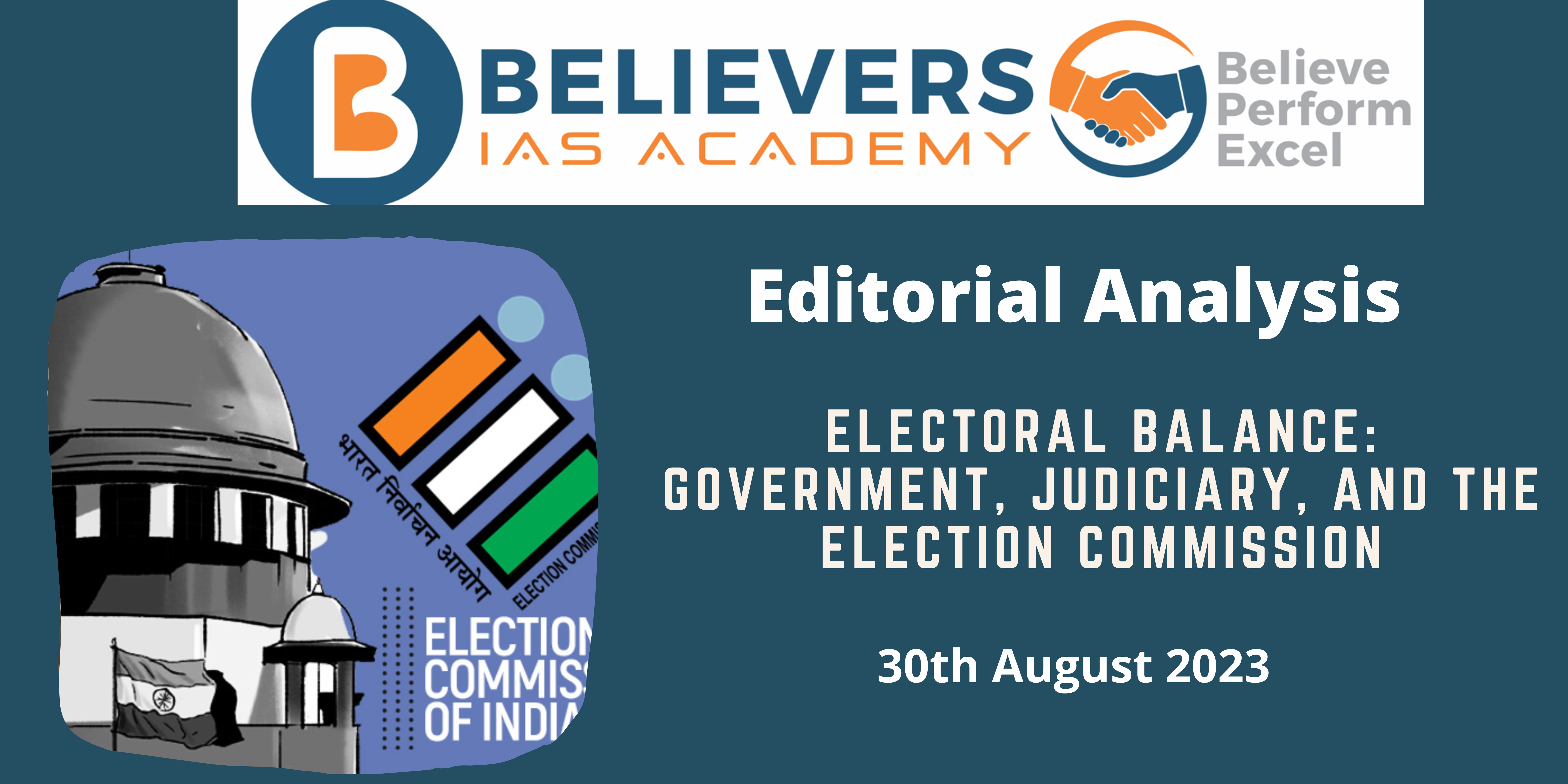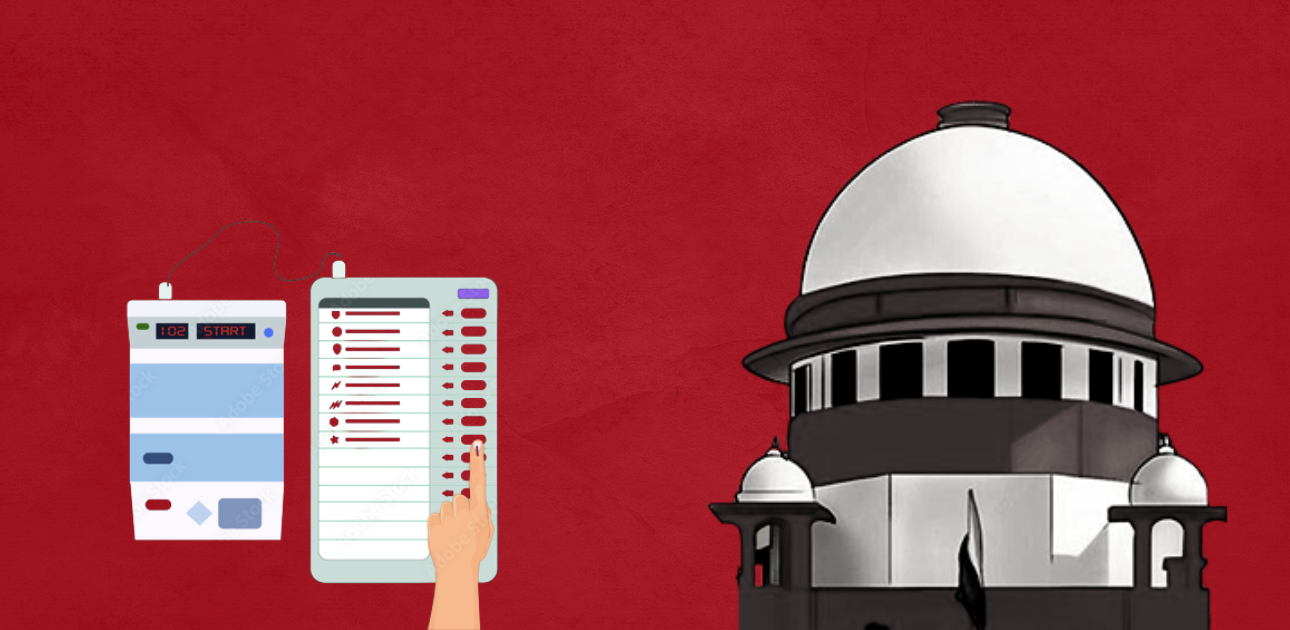Electoral Balance: Government, Judiciary, and the Election Commission
Context:
In recent times, the Election Commission of India (ECI) has emerged as a focal point of contention between the government and the judiciary, with the current debate centering around its appointment process.
Relevance:
GS-02 (Indian Polity)
Prelims:
- V.M. Tarkunde Committee in 1975
- Dinesh Goswami Committee
- Election Commission of India (ECI)
Mains Question:
- Assess the implications of the proposed changes to the Election Commission’s appointment process and the ensuing power dynamics between the government and the judiciary, while analyzing the potential consequences for the institution’s autonomy and its role in preserving democratic fairness. 250 words.
Dimensions of the Article:
- The Appointment Dilemma
- Current Controversy
- Implications for Electoral Fairness and Democratic Integrity
The Appointment Dilemma:
- The issue of appointing the Chief Election Commissioner and Election Commissioners has been the subject of intense policy and political discourse, tracing back to the deliberations of the Constituent Assembly. These discussions have led to significant insights and observations over the years.
- During the Constituent Assembly Debates, suggestions were put forth that proposed the confirmation of the Chief Election Commissioner’s appointment through a two-thirds majority vote in a joint session of both Houses of Parliament (Constituent Assembly debates, June 15, 1949). Nevertheless, Parliament was entrusted with the responsibility of enacting suitable laws in this regard.
- Several committees, including the V.M. Tarkunde Committee in 1975, the Dinesh Goswami Committee on electoral reforms in the 1990s, and the second Administrative Reforms Commission in 2009, advocated for a more diverse appointment process, emphasizing a collegium-based approach over exclusive government discretion in recommending appointments.
- In 2006, B.B. Tandon, a former CEC, proposed a seven-member committee led by the Prime Minister to select the CEC and ECs, comprising the Lok Sabha Speaker, Leaders of the Opposition in both Houses, the Law Minister, the Deputy Chairperson of the Rajya Sabha, and a Supreme Court judge nominated by the CJI. Notably, the BJP supported such a suggestion, advocating for a representative collegium involving the CJI to appoint these top electoral officials. The BJP’s stance at the time underscored that any governmental oversight of the Election Commission would undermine its independence.
- In subsequent years, leaders such as L.K. Advani reiterated the call for a collegium chaired by the Prime Minister, comprising the CJI, the Minister of Law and Justice, and the Leaders of the Opposition in both Houses. The prevailing system, wherein the President appoints ECI members solely on the Prime Minister’s advice, was perceived as inadequate in inspiring public confidence.
Current Controversy:
- The government’s current move to revise the appointment process has ignited a fresh debate. The proposed Bill seeks to replace the Chief Justice of India with a Union Cabinet Minister in the selection committee. This shift, if executed, would amplify the government’s role in selecting top election officials and amplify its influence over the institution’s operations.
- Historical recommendations and past debates never advocated for replacing the Chief Justice of India with a Union Cabinet Minister. Instead, they underscored the importance of involving the CJI or a judge nominated by them.
- This new Bill’s deviation from these recommendations suggests an inclination towards further governmental control, potentially undermining the ECI’s autonomy and compromising its impartiality. The move also paints a concerning picture of democratic erosion.
Implications for Electoral Fairness and Democratic Integrity:
- The need for reforms in the ECI’s appointment procedure was a concern voiced by Opposition parties, including the BJP, especially during the Congress regime. The aim was to mitigate the structural advantage that ruling parties hold over institutions, which can lead to manipulation and biases.
- A more representative selection committee was seen as a means to foster fairer elections by reducing the incumbent party’s influence over the ECI. However, with the introduction of the new Bill, the BJP, currently in power, is diverging from its previous position and seeking to consolidate its control over the institution.
- The Election Commission of India has earned the trust of the Indian populace as a reliable and responsible institution. Managing elections involving nearly 900 million voters amidst socioeconomic disparities is a remarkable accomplishment. However, perceived leniency toward the ruling party, whether in managing election schedules, addressing electoral propaganda, or ensuring fairness, threatens the ECI’s autonomy and erodes public trust.
- In its present form, the government acknowledges the ECI’s autonomy, but this independence doesn’t align with its objectives. The government’s statutory mechanisms to gain a firmer grip on the ECI underscores a desire for enhanced control. This shift may have repercussions for democratic integrity and the institution’s ability to fulfill its role impartially.
Way Forward:
- To preserve the sanctity of the Election Commission and its role in maintaining electoral fairness, it is essential that appointment procedures remain impartial and inclusive.
- The recommendations of past committees, which emphasize the involvement of the Chief Justice of India or a judge nominated by them, align more cohesively with the principles of fairness, autonomy, and impartiality. Moreover, maintaining a clear separation of powers and reducing the influence of incumbent governments in the appointment process will enhance the ECI’s ability to uphold democratic ideals.





